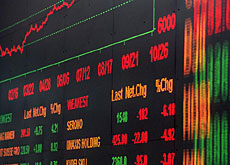IMD study shows mixed competitive result

Switzerland has kept its eighth place in the annual global competitiveness ranking by Swiss management school IMD, but it is described as a "split performance".
Although the country does well in terms of its financial system and the stock exchange, economic credibility, infrastructure, comparatively low unemployment and inflation, its low economic growth drags it down.
“On the one hand we see that the international economy is performing very well. We have seen this in certain industry sectors like banking and pharmaceuticals, but the domestic economy is still lagging behind,” Stéphane Garelli, head of the IMD’s World Competitiveness Center, told swissinfo.
“One of the reasons is that business is finding that the growth areas in the world are to be found outside Switzerland and not in Switzerland any more.”
Switzerland’s economy grew by only 1.9 per cent last year, putting it in 49th position in terms of gross domestic product (GDP) growth among the 61 countries and regional economies featured in the IMD’s report, the World Competitiveness Yearbook 2006.
With 39 countries showing growth rates above three per cent in the IMD’s rankings, questions have to be asked why Switzerland seems to have a problem translating its successes into overall economic growth.
Adverse to risk
Garelli says that the main objective of part of the Swiss population is no longer to increase wealth or be more dynamic. It’s a case of holding on to what they already have.
“This sense of preserving what we have in Switzerland – a good standard of living but also a very high quality of life – means that we are becoming adverse to risk,” he said.
“We do not have the ability any more to seize the growth opportunities inside Switzerland. They are being seized outside now.”
The IMD, which is based in Lausanne, says a greater part of Switzerland is becoming entrepreneurial and grasping the opportunities offered by emerging markets.
This is particularly evident in finance, chemicals, pharmaceuticals, precision tools, watches, luxury goods, food and smaller exporting enterprises.
High prices
“It’s good that Swiss enterprises are taking up the opportunities and challenges of the global economy. If we were not doing that, then probably most people would criticise Swiss business for being too cosy,” Garelli said.
But the rest of Switzerland remains caught up with high prices, a lack of transparency, overregulation and an increasing fear of the future.
Citing the case of United States biotechnology company Amgen, which last year was interested in building a plant in Switzerland but eventually chose Ireland, Garelli said the country had to simplify its regulations.
“Switzerland can be very competitive in terms of skills it can offer but really the name of the game is to make it more simple for people to operate in Switzerland.
“And here we are penalised because we have built a system which is so complex that not even we sometimes know how it operates.”
swissinfo, Robert Brookes
Switzerland:
Overall 2006 position: 8th
2005: 8th
2004: 14th
2003: 9th
2002: 5th
The Geneva-based World Economic Forum also ranked Switzerland in eighth place in its Global Competitiveness Report published last September.
The IMD says that in 2006 competitiveness is a more compact race than ever before. Although the United States remains number one in the rankings, Hong Kong (2) and Singapore (3) are closing the gap.
It argues there is a striking difference between the achievements of the US economy last year (3.5% growth) and the $318 billion (SFr390 billion) budget deficit accumulated by the government and the $8,000 billion debt.
It adds that some governments fail to contribute to the overall competitiveness of their country.
The Swiss government is described as “credible”, ranking in eighth position worldwide for its efficiency.

In compliance with the JTI standards
More: SWI swissinfo.ch certified by the Journalism Trust Initiative











You can find an overview of ongoing debates with our journalists here . Please join us!
If you want to start a conversation about a topic raised in this article or want to report factual errors, email us at english@swissinfo.ch.